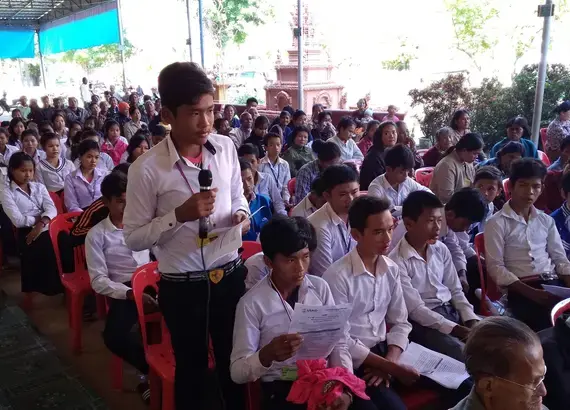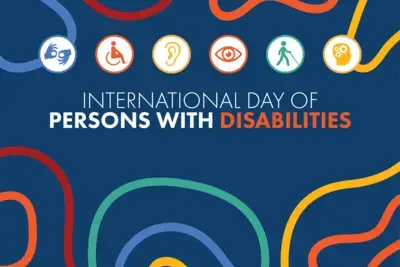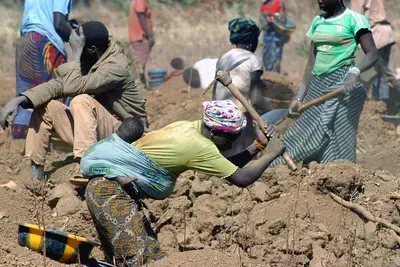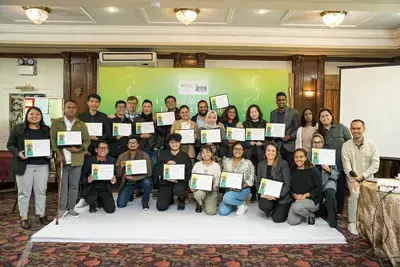
Inter-Commune Forum on citizen's participation in democratic development held on December 29, 2016 in Banteay Meanchey, Cambodia.
Success Story
Trainings Spark Civic Engagement in Cambodian Communities
When Cambodian voters cast their ballots in June 2017, local leaders will be chosen to represent their communities on the Commune Council. This election presents a rare chance to draw attention to local government, its unique challenges, and its accountability to citizens. Recognizing this opportunity, the Cambodian Civil Society Partnership (CCSP) launched its Civic Engagement in Democratic Development trainings, designed to strengthen collaboration between elected representatives and their constituencies.
The trainings are one part of the NDI Cambodia’s two-fold approach to civic engagement. CCSP complements the ‘bottom-up’ voter education efforts of other NDI partners by providing ‘top-down’ preparation for commune councils. Equipped with a greater appreciation for citizen engagement, local leaders can then facilitate more frequent and more effective participation in commune planning processes.
The nine trainings held from July to September 2016 reached a total of 113 commune councilors, district officials, and youth leaders across six provinces. Each directly addressed specific knowledge and skill gaps among officials, covering methods for mobilizing citizens, tools for collecting information, the appropriate qualifications of leaders, and best practices in democratic development.
Before I just thought I wanted to be a candidate for the commune election in this term, because I could have monthly salary to support my family. Now, I am aware that my job is to work for the development of the whole community and I commit to develop my community for a better future.
- young woman from Kampong Chhnang province
Citing low turn-out at commune planning forums, a majority of participating officials were most interested in learning specific techniques for engaging citizens in commune council decisions. One participant reported that he had “never attended such an important topic,” and said that discussions of constituent outreach made him “think critically on the role of citizens in the democratic development [of the commune].”
Participants at another CCSP training reported that the training gave them a new perspective on the role of commune councilors. “I have learnt more about my role in the commune development,” said a young woman from Kampong Chhnang province. “Before I just thought I wanted to be a candidate for the commune election in this term, because I could have monthly salary to support my family. Now, I am aware that my job is to work for the development of the whole community and I commit to develop my community for a better future.”
A recent survey conducted by NDI found that most commune-level efforts to gather citizen input fail to reach many constituents. CCSP’s trainings allowed local leadership to discuss new ways of reaching constituents with their counterparts from other communes, all under the facilitation of a skilled trainer. The exchanges left participants interested in other ways they could improve their local governments, requesting further technical assistance on civic engagement and conflict resolution.
The lessons the participants learned will help them to facilitate discussions in and share their experiences with their communities. “The concept of training helps me to understand more about approaches to engage citizens in the commune development,” one female youth in Battambang province explained. “It is very useful for both supply and demand sides. Honestly, I have never facilitated such a formal meeting before, but now I am happy that I can share my experiences with my friends at my school too."
Other participants, particularly women, found the explorations of quality leadership the most useful. CCSP’s participatory training approach facilitated discussions on leadership through both classroom lectures and role-play exercises, challenging participants to consider issues from the citizen’s perspective.
Not only were the trainings valued by participants, they were also effective. Participants were asked to take two tests, one before each training and one immediately after. On average, the post-training scores showed a considerably higher grasp of the material than pre-training scores. Participants provided positive feedback, requesting only that additional trainings be held, each for an extended period of time to allow for more detailed, honest, and constructive dialogues between commune officials and youth leaders on critical areas of improvement in the commune.



